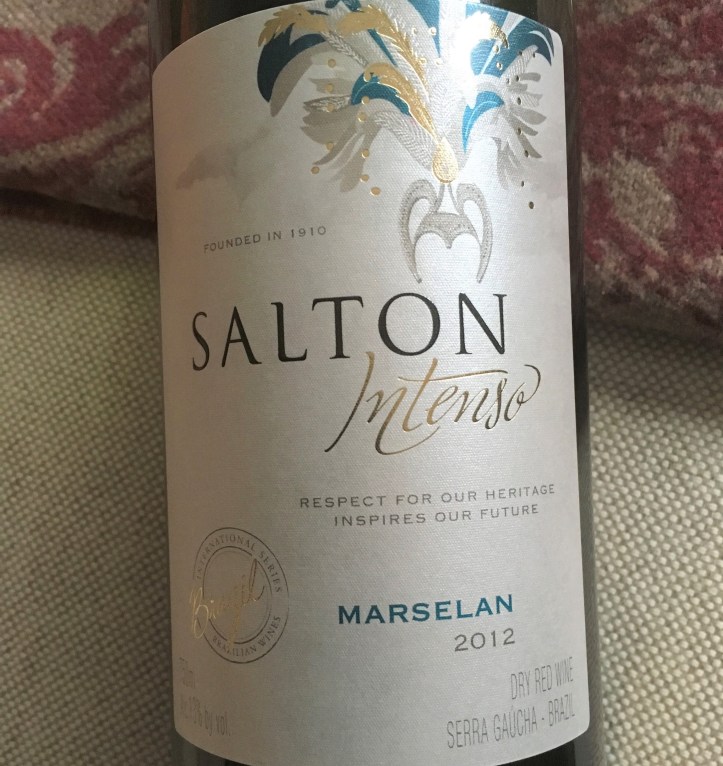April 27th is the day wine lovers the world over celebrate Marselan. Until a few days ago, I was unaware of that fact; come to think of it, I was unaware of the grape as well. But, thanks to Jeff Burrows of FoodWineClick! fame, there’s been a flurry of activity in wine shops across the US this week, as all of Jeff’s blogging friends try to locate a bottle of the elusive wine.
Jeff raised our collective curiosity about Marselan by posting a photo of a bottle he had bought in China. Sporting a beautiful label decorated with inscrutable text, it was an irresistible invitation to join the hunt. I immediately began trolling the on-line inventories of local NYC wine shops for a bottle. Easier said than done.

After contacting three stores, I found a bottle of Marselan – from Brazil – at Astor Wines. And this being New York City, I made a few clicks, added the Marselan and a few other treats to my shopping cart, and entered my contact information. A few seconds later, my email confirmation arrived, indicating my order would be delivered the next day. Yes, folks, that’s the best thing about living in this crazy city: just about everything you need, want, or might be thinking about can be delivered right to your door!
Marselan – A Crossing of Two Famous French Grapes
In 1961, Paul Truel, a scientist with the Institut National de Recherche Agronomique (INRA) in Montpellier, France, created a new grape variety by crossing Cabernet Sauvignon with Grenache Noir. The idea was to marry the structure and elegance of Cabernet with the disease-resistance and high yields of Grenache. In essence, he sought a grape that would thrive in the coastal areas of southern France, giving rise to elegant wines capable of aging. Marselan was born.
Today, Marselan is grown successfully in the Languedoc, Spain, Argentina, Brazil, and China, particularly in areas prone to high humidity, where fungal diseases lay waste to the vines.
World Marselan Day
The Marselan celebration is the brain-child of Jim Boyce, creator of the Grape Wall of China website. He chose Paul Truel’s birthday so that the man’s contribution to ampelography would be better known and his crowning achievement recognized. Jim’s goal is to get the word out on this obscure grape, encourage people to taste the wines, and create a social media presence that will gather steam, further promoting the growers and winemakers who specialize in Marselan.
How Can I Participate?
Interested? If you’ve managed to get your hands on a bottle of Marselan, take a photo of the label – heck, take a bunch of photos – and post them to Twitter, Instagram, Facebook, and anywhere else you linger on the social spectrum. Just be sure to tag your pics with #WorldMarselanDay. And be sure to tag @worldmarseland1 in all of your tweets!
If you’d like to learn more, there’s a web page dedicated to the celebration, that’s loaded with details on Paul Truel and his discovery, the characteristics of the grape, the flavor and aroma profiles of the wine, and a roll-call of major producers.

2012 Vinícola Salton Intenso Marselan (13% abv; $17.98 retail price)
100% Marselan from vineyards in Serra Gaúcha, Brazil. It’s an area that has trouble ripening grapes in general, except for an area known as Vale dos Vinhedos, or Valley of the Winemakers. Encompassing three main villages, Bento Gonçalves, Garibaldi, and Monte Belo do Sul, the Vale dos Vinhedos has had success with international varieties that tend toward early ripening.
Color: Deep ruby, with flashes of violet throughout.
Nose: A bouquet of red fruit, especially cherry, followed by a savory note, perhaps roasted meat. There’s also a faint herbaceous note that’s quite pleasant.
Palate: Cherry and plum, with medium acidity, medium body, and smooth, silky tannins. At first sip, this wine seemed simple but not compelling. After an hour, however, it blossomed into quite a tempting treat. Sweeter, more dried fruit (think fig) aromas emerged, and the palate seemed to come together. The tannins, hardly noticeable in the beginning, made themselves known, very politely. I kept returning for another sip; then another.
The Verdict: I was super-surprised by this wine! It seemed to change in the glass every few minutes, keeping me very interested. There was no tech sheet available for the wine, but I found it remarkably fresh for a 2012. I didn’t detect overt oak influence, either, but perhaps neutral barrels were used. In any case, I’d happily drink this Marselan again. It really tickled my fancy!
About Vinícola Salton
Founded in 1910 by Italian immigrants, Vinícola Salton is most famous for sparkling wine, which sells very well in Brazil (so does beer). Taking into account their entire portfolio, Salton produces about half the wine on the Brazilian market. Despite its size and dominance of the industry, Salton is still family-owned and managed. The current director represents the fourth generation at the helm.
Note: If you’re curious about Brazilian wine in general, please check out three articles I wrote just before the 2016 Olympics in Rio de Janeiro. I delved into the history of winemaking there; the regions and grapes grown in each; and what the future holds for Brazilian wine.
Thanks for reading along, and Happy World Marselan Day!
SO cool – having lots of fun learning!
LikeLiked by 1 person
I was so pleasantly surprised by this wine! Really lovely.
LikeLike
[…] Swirling Dervish explores the little-known varietal Marselan on World Marselan […]
LikeLike
thanks to share us
LikeLike
[…] create a social media presence that will help generate interest in the grape. Celebrating Marselan on the birthday of Paul Truel, creator of the Marselan, also helps recognize his […]
LikeLike